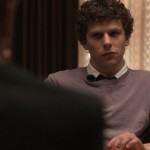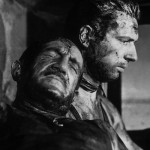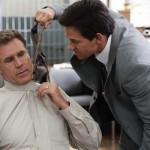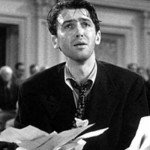Do the Right Thing Review
Posted on October 6, 2010 By John Gilpatrick 1980s, Classic Reviews, John's Hall of Fame, Movie Reviews
*Caution: Mild spoilers may follow.
Spike Lee has directed many joints in his career, but none is as admired and revered as Do the Right Thing. It’s a brilliant slice-of-life that tackles issues of race head on and without fear. It’s the kind of film that earns the label of “controversial,†not because it provokes with its radical ideas but because it asks you to answer some difficult questions. Lee’s direction, by putting you in this neighborhood and making you care about these characters, is incredible, and he’s assisted by the work of a tremendous cast. But it’s the rawness and the power of Do the Right Thing that makes it such a monumental piece of cinema and something everyone, no matter their race, should experience.
It’s one of the hottest days of the year, and the residents of the Bedford-Stuyvesen neighborhood of Brooklyn are preparing for it. Sal Fragione (Danny Aiello) and his sons, Vito (Richard Edson) and Pino (John Turturro), are opening Sal’s pizzeria, a stalwart of the neighborhood for over 20 years. Mookie (Spike Lee), Sal’s delivery man, uses his job as an opportunity to socialize with the locals, like Da Mayor (Ossie Davis), Mother Sister (Ruby Dee), Radio Raheem (Bill Nunn) and Buggin’ Out (Giancarlo Esposito), who is trying to organize a boycott of Sal’s because the owner won’t put up any pictures of famous African-Americans on his “Wall of Fame.â€
To truly appreciate Do the Right Thing, one must look at the film’s two very distinct parts, the first of which is a seemingly authentic look at a normal day in a Brooklyn neighborhood. Here, Lee allows us to get to know these characters in a very intimate way. We see what they do to try to beat the heat. For many of the characters, we are exposed to their demons (Pino’s racist behavior, Buggin’ Out’s penchant for causing trouble, Da Mayor’s drinking, Mookie’s inattentiveness to his girlfriend and son). Yet, at the same time, none of the characters is one-dimensional. They are all sympathetic to a degree and there’s no doubt that watching this film, you should be able to relate with at least one its colorful characters.
I wasn’t completely unprepared for what happened in the film’s final act because I went in knowing the film erupts into a stirring portrait of bigotry and racial hatred, but I was still caught off-guard by how the drastic the shift in tone is and how brutal and uncompromising these scenes are. On the surface, it appears this anger erupts out of nowhere, but because we know these characters well, we know something horrible was bound to happen eventually. Lee’s point isn’t that one group is wrong, but rather that no one did the right thing in this situation. He avoids turning one character into the heel. Instead, they are all at fault. It appears only some of the characters will face consequences for their actions, but that’s just not the case. Everyone in this neighborhood will carry scars from this day for a long time.
Lee can only do so much, though. At some point, he must rely on his actors to make us care about the characters and get invested in this neighborhood. Luckily for him, his film is populated with a number of perfectly cast men and women doing the work of their lives. First and foremost is Danny Aiello, the only actor from the cast to earn an Oscar nomination for his work here. He’s a seemingly level-headed guy who has become a part of this primarily black neighborhood despite the color of his skin (and despite the pictures on his wall). Like everyone else around him, he changes. Yet, his transformation is frighteningly severe—all thanks to the absolutely perfect way in which Aiello lets this character develop.
Also impressive are Ossie Davis and John Turturro. Da Mayor is perhaps the one character in the film who ends up better off at the film’s conclusion. He saves a young boy’s life and finally earns the respect of Mother Sister. We sort of neglect his more negative traits and really care for him because he has a heart of gold. John Turturro’s Pino is the opposite. He’s pretty much an all-around asshole. But by the film’s conclusion, he achieves a sad sort of validation. That doesn’t mean he’s right, but in his mind, he is. And something about that odd character arc made me feel for him. Pino and Da Mayor are two of the film’s most fascinating characters, but they wouldn’t be if it weren’t for the exceptional work by these two actors.
Part of this film’s magic is the subtleties that its admirers have debated for years. It’s considered one of the most controversial films in history for a reason—because emotions run very high and Lee doesn’t provide any easy or obvious answers to such pressing questions as…
Is Sal a racist? I think so, but many others would likely disagree with me. He’s certainly a shrewd businessman to be able to stay in this neighborhood for so long with a temper like that. But if he is a racist, why does he treat Mookie and especially Mookie’s sister with such respect?
Does Mookie do the right thing? He was wrong, but no more wrong than Buggin’ Out, Radio Raheem, Sal, Pino, or anyone else for that matter. And he certainly is less wrong than the police. But don’t tell that to Lee. He has said that only white viewers have asked him this question, and those who do must believe a white man’s property to be worth more than a black man’s life.
If not, what is the “right thing†referenced by the film’s title? I think the right thing is something that didn’t happen, that one action that could have prevented the incident, but was tragically missing that night.
There’s no way I’ll ever forget the incredible power of this film. Everything about it just comes together in such spectacular fashion. It stirs your emotions. It engages your intellect. And it will make you rethink your beliefs on race, racism, and racial violence. Lee hasn’t made anything quite as good in the 20 years since Do the Right Thing’s release. But he doesn’t really have to. This is a masterpiece in every sense of the word, and no one can take that away from Lee.
1989, 4 Stars, Barry Alexander Brown, Bill Nunn, Danny Aiello, Do the Right Thing, Ernest Dickerson, Giancarlo Esposito, John Turturro, Ossie Davis, Rosie Perez, Ruby Dee, Samuel L. Jackson, Spike Lee















